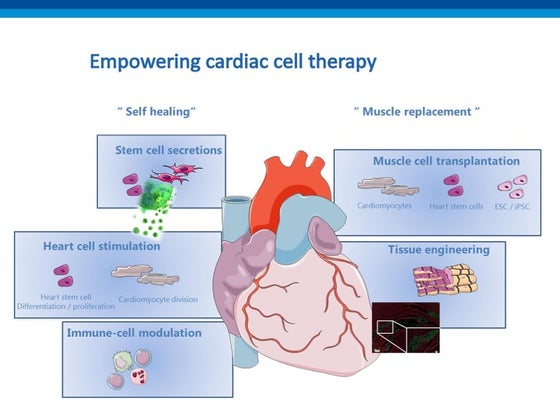Group Sluijter
Group Sluijter
The heart muscle can regenerate, but it isn’t effective enough to completely repair damage caused by injury or disease, and efficient treatments are limited for patients with chronic heart disease or severely decreased heart function. Thus, for most severe cases, a heart transplant or mechanical support are the only options. Options limited by rejections and available donors.
We focus on ways to help our hearts repair themselves through engineering heart muscle cells for cell therapy, using vesicles (exosomes) to deliver essential components to help repair and investigating whether the immune system can prevent further damage of heart tissue.

Healing a broken heart
Renewal of heart muscle cells (cardiomyocytes) is extremely low, about 1% per year, which decreases with age. As this is not enough to repair an injured section of the heart, how can we improve this ability?
Understanding heart biology
Before tinkering with or injecting anything in the heart, we need to fully understand the biology of the heart, both healthy and diseased. We’re part of an international consortium that uses induced pluripotent stem cells (iPS cells) to model the myocardium, heart muscle tissue. iPS cell technology allows us to take, for example a skin cell, reprogram it back into an immature state, and then direct it to become a cardiomyocyte. This cardiomyocyte carries the exact genetic blueprint of the patient it came from. Together with biofabrication and microchip technologies, we’re creating heart disease in a dish in order to understand the affect certain variables such as cell types, oxygen and pressure may have on heart repair.
Transporting repair materials to the heart
We’re also studying exosomes, vesicles that bud off from a cell and are important in communication between cells and the transport of certain large molecules. Research in this field suggests that exosomes may be beneficial for heart repair. We’re interested in the proteins and microRNAs they naturally carry, and are figuring out whether these can help the heart repair itself. We’re also in the process of upscaling the isolation and production of exosomes for therapeutic use and are determining the best method for delivery to the heart.
Can heart repair get a boost from the immune system?
Our third area of interest is the immune system. Inflammation in the immune system prevents damage and it’s known that autoimmune antibodies are present during and after a heart attack. We’ve combined stem cells with immune cells (B cells) and see that the stem cells can suppress B cell response; thus, we think we can prevent damage from occurring. What’s intriguing is that during chronic (long-term) inflammation we also see antibodies from B cells. Now, we’re investigating whether inhibiting the immune system earlier will help prevent heart muscle damage.
Researchers
Pricipal Investigator
Postdocs
- Alain van Mil, PhD
- Zhiyong Lei, PhD
- Klaus Neef, PhD
- Pieter Vader, PhD
- Saskia de Jager, PhD
- Dries Feyen (Stanford), PhD
PhD Students
- Judith de Haan
- Patricia van den Hoogen
- Casper van de Ven (MIT, USA)
- Emma Mo
- Sandra Crnko
- Anna Kargaard (Stellenbosch University)
- Evelyne Demkes
- Tom Bracco Gartner
- Marieke Roefs
Supportive staff
- Corina Metz
- Hemse Al-Khamisi
- Inge Dokter
- Maike Brans
More information
Contact
Most downloaded article from the ESC journals in 2018:
Cardio Vasculair Tissue Regeneration
In deze folder bevindt zich extra informatie door middel van een video. Scan de bovenste QR-code met uw telefoon om deze video te bekijken. Of bekijk de video via:

